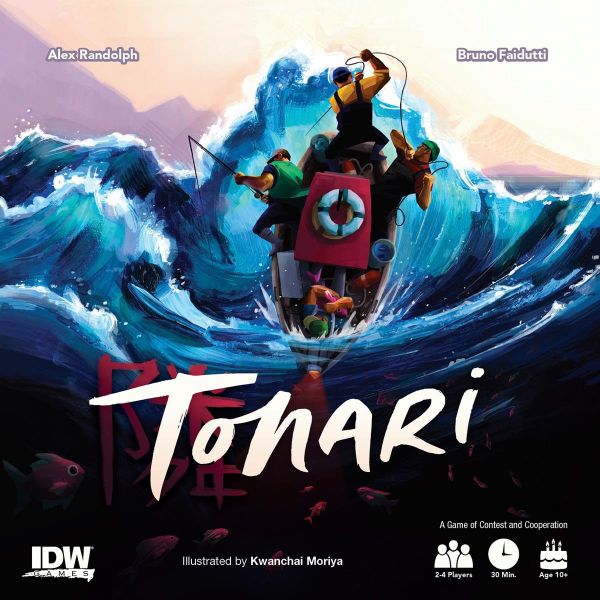The very real island of Kuchinoshima lies to the south of mainland Japan. It boasts no airport, but a 6 hour ferry trip will happily drop you off at a small port on the volcanic island, where agriculture and fishing are the primary industry.
However, it was no volcanic eruption that decimated the island of Kuchinoshima featured in Tonari from IDW Games, but a violent storm that robbed the residents of all but a single dinghy (their word, yet I can’t help but think of Tommy Boy every time I hear it).
So all of the fishermen must share this single craft and provide food for the residents…but you know they’re going to make a competition of it!
Playing Tonari
Two to four players disembark from the island of Kuchinoshima on the same boat, taking turns piloting it from one hex to the next to collect a fish tile. Tonari is a set collection game, so the more of a single colored fish you have, the more points they’re worth during game end scoring.
Here is a comprehensive list of all that each player can do on their turn:
- Move the boat to an adjacent hex
Yes, it really is that simple!
(Bonus trivia content: Tonari is romaji for the kanji that means “next to,” so the one thing you can do on your turn is on the tin!)
The only exception to this rule is the Pink fish which must be collected from two spaces away. All other tokens, including the Skill Tokens, are collected by moving into their space from a neighboring one. Skill Tokens allow for the player to swap a fish token in their possession for one of an opponent’s, swap the position of two tokens still on the board, rid the board of a single token, or double the point value for either the Blue, Red, Green, or Yellow fish.
The Purple trash tokens are worth -5 points when calculating your score, and the Orange shrimp tokens net the player with the greatest number of them in their possession a flat 8 points. In the event of a tie with the Orange tokens, no points are awarded to any player!
The aim of the game is to set yourself up for the highest scoring catch, of course, and in a two player game this should be fairly straight forward – though not devoid of strategy. Moving onto a token advantageous to your own score might set your opponent up quite nicely on their next move, too, so you’re constantly eyeing their tokens and picking out the best path amongst the available fish.
If you play with three or more, the scoring and strategy evolves quite a bit, as your score is now the sum of your catch plus that of the neighbor to your left!
The game end is triggered if the boat finds itself without a token in an adjacent hex and with no Pink fish within their two hex radius. This could mean you’re sitting on 10 tokens…but there isn’t anything stopping someone from triggering the game end with a whole lot less than that in hand if they think it can net them the win!
Tonari was a hit with all of the age groups I played it with – ranging from 11 year olds right on up to folks in their 40s – and there’s no reason to think octogenarians wouldn’t pick it up as quickly or love it any less! Let’s look at why this game had people hook, line, and sinker.
Staking Our C.L.A.I.M. on Tonari
 Components
Components
Tonari features a board, a rulebook, a wooden boat token, and 42 fish and skill tokens. But while the components aren’t numerous, they are all well done.
While the boat is your standard wooden deal, everything else is standout. The rulebook’s dozen pages are deceptive, as only 2 front-and-back pages (one of which is the cover) hold all of the necessary information to play. They just went ahead and produced it in English, German, French, Dutch, Spanish, and Italian. An appreciable touch.
The board, box, and tokens feature beautiful art by Kwanchai Moriya. The board is made of sturdy cardboard while the tokens are plastic discs about 1/8 of an inch thick. They kinda remind me of slammers from POGS…Does anyone else remember those things? No? Just me?
The only knock I have is that the art on the discs will see some significant wear over time as they’re packed, unpacked, shuffled, stacked, spun, and otherwise fiddled with by players during the game. I’ve played about a dozen games and I’m already noticing some marring.
 Luck
Luck
To prepare a game, the tokens are flipped upside down and shook up/shuffled in the lid of the game box before being placed on the board. That is the only hint of randomness in the game and it is essential.
The next closest thing to luck you’re likely to experience during play is the consequence of the routing decisions made by the other players. In a 2 player game, you’re at your opponent’s mercy just as they are at yours, but you’ll have a good idea from move to move where the boat might end up.
In a 3+ player game, the boat’s location come your turn becomes a bit less predictable, but the option to influence its location to your advantage is enabled by the cooperative nature of the scoring.

 Aesthetics
Aesthetics
I really dig the painted aesthetic of all of the components. All but the island area of the board looks like it could well be a print of a hand-painted piece by Moriya – complete with textures. Not sure why the island doesn’t fit that look, and it is a bit jarring.
The only other knock I’d pass out here is the inclusion of the number 8 on the Orange shrimp tokens, as every group I played with misinterpreted that as each token being worth 8 points. This is a relatively easy mistake even after hearing (but clearly not listening!) to the rules concerning those tokens as the only other tokens to feature numbers are each worth what they show. Just a bit confusing, is all.
 Interest
Interest
Tonari is both a great filler title on a game night and one that can be played over and over and over again in quick succession – especially if you’re playing with 3 or more and shuffle seating positions (and thus scoring partners!) between games.
You can set it up and teach it in less than 5 minutes, and while the box says play time averages around half an hour, most games will end in half that time or less.
The set collecting is fairly simple and straightforward, but the partnered scoring of the 3+ player games and the token manipulation afforded by the Skill tokens keeps it from being too simple.
 Mood
Mood
Tonari is simple and simply fun. If you’re the kind of gamer that just needs complexity in order to achieve enjoyment, then Tonari isn’t for you. Absolutely nothing about this game is complex, and that is a beautiful thing in my opinion.
I’d definitely argue that this is an okay game for 2 players but a much better game for groups of 3 or more. There isn’t a lack of strategy when you’re playing one on one, but it definitely ratchets up significantly when you’re having to manage more than your individual score. Although I’ll be the first to admit that I don’t quite understand how the partnered scoring fits the “best fisherman” theme, I do think it is the aspect of the game that makes it stand out.
I’ve played with adults who plotted their route around the board with as much thought as Kasparov at Chess and with kids who did what was best for their individual score without a care for the fact that they were gifting too many points (and therefore the win) to a neighbor. Tonari was enjoyed equally by people in both camps. I can dig that.
Whether playing with the least possible players or the most, you’ll enjoy the routing decisions and they can be reasonably plotted for several moves if you’re sharp! So even when it’s not your turn, you can stay engaged. In some games, you’ll collect most of the 42 tokens; in others, eager victors will end it after just a few turns per person. I really like that flexibility!

No Fishing Permit Required
IDW has a great game on their hands in Tonari. I’d put this high up on my favorite set collection games, for sure. We need to write that list up sometime…
But I digress!
What I’m saying is it’s a keeper. Its ease of accessibility and learning has already earned it a spot in the trunk of my car where games go to live when I want to play them with others and might have little to no advanced notice to have a game on hand. It is trunk worthy. Practically and realistically speaking, I don’t know that I can award it a higher accolade.
Set your hook in a copy here!
[Disclosure: IDW provided Nerds on Earth with a copy of Tonari in exchange for a honest review.]



